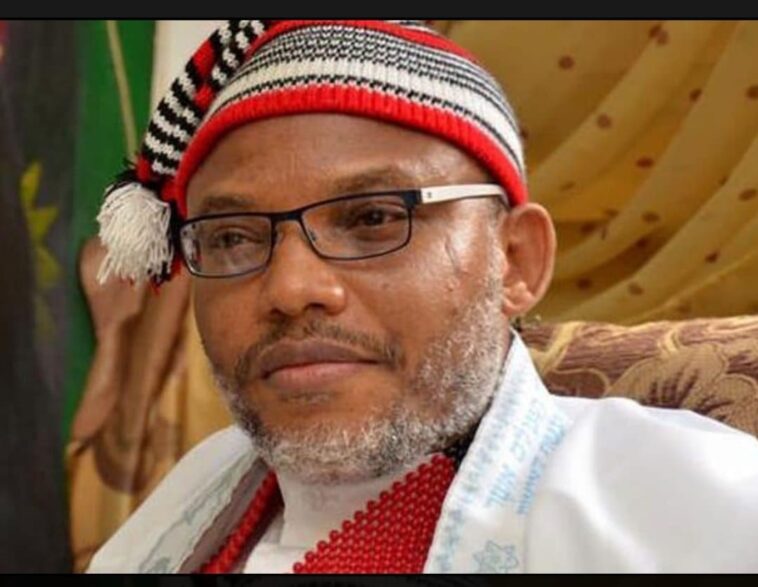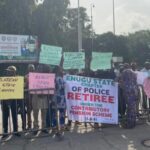The detained leader of the Indigenous People of Biafra (IPOB), Nnamdi Kanu, has filed a preliminary objection before the Federal High Court sitting in Abuja, challenging the court’s jurisdiction to try him.
Kanu in the notice of preliminary objection to jurisdiction of the court filed on Monday through his legal team led by his special counsel, Barrister Aloy Ejimakor, told the court that it has no jurisdiction to try him, stressing that charges filed against him before the court by the Nigerian government are unconstitutional.
Kanu filed the notice of preliminary objection on the strength of Sections 1(3); 6(6); 12; 36(2): 36(8): 42; 45 and 251(1)(q) of the Constitution of the Federal Republic of Nigeria, 1999 (as amended);
Section 178 of the Customs and Excise Management Act (as repealed); Sections 218 (1) & (2) and 220 of the Administration of Criminal Justice Act 2015; The Terrorism Prevention Amendment Act 2013 (as repealed) and Under the inherent jurisdiction of the Court.
He said that the court has no jurisdiction to try him on counts 1,2,4,5 and 8, on the points and authorities to the extent that the provisions of the Terrorism Prevention and Amendment Act 2013 (TPAA) enabled the Nigerian government to determine questions arising in the administration of TPAA which led to the ex parte order of proscription of IPOB and its declaration as a terrorist group and the gazetting of such order (without giving the Applicant an opportunity to make representations to the authorities), is void for being inconsistent with the provisions of Section 36(2) of Constitution of the Federal Republic of Nigeria, 1999 (as amended) (CFRN or the Constitution).
The legal team said that Section 36(2) of the Constitution provides, “Without prejudice to the foregoing provisions of this section, a law shall not be invalidated by reason only that it confers on any government or authority power to determine questions arising in the administration of a law that affects or may affect the civil rights and obligations of any person if such law:
“(a) provides for an opportunity for the persons whose rights and obligations may be affected to make representations to the administering authority before that authority makes the decision affecting that person; and
“(b) contains no provision making the determination of the administering authority final and conclusive.”
The IPOB leader prayed the court for “An order of this Honorable Court declining jurisdiction to entertain counts 1,2,3, 4,5 and 8 of the charges against the defendant/applicant or to quash said Counts on the ground that the Law upon which said Counts are predicated is unconstitutional.; and Law under which Applicant is being tried in these Counts has otherwise been repealed.
“An order of this Honourable Court declining jurisdiction to entertain count 3 of the charges against the defendant/applicant or to quash said Count on the ground that the said Count is unconstitutional, it is not supported by proof of evidence and is otherwise an abuse of process.
“An order of this Honorable Court declining jurisdiction to entertain counts 1,2,4,5 and 8 of the charges against the defendant/applicant or to quash said Counts on the ground that the Applicant is misled by the absence of, or the failure to state the place of commission of the alleged offenses and the specific dates of the broadcasts alleged.
“An order of this Honorable Court declining jurisdiction to entertain count 15 of the charges or to quash said Count on the ground that the said Count is not in compliance with the Administration of Criminal Justice Act; is not within the territorial jurisdiction of this Honorable Court; and is not supported by any proof of evidence; and Law under which Applicant is being tried in these Counts has otherwise been repealed.
“And for such further order(s) as this Honorable court may deem fit to make in the circumstance.”
The preliminary objection to the court’s jurisdiction was sequel to the ruling by Justice Binta Nyako of the Federal High Court in Abuja on Monday afternoon where she dismissed Kanu’s fresh application seeking the restoration of his revoked bail and his removal from the DSS custody to a house arrest or prison custody.
The judge who dismissed the application for lacking in merit, said that Kanu had brought the same application before the court.
Despite the Supreme Court’s ruling in 2023 that Kanu did not jump bail, Justice Nyako said that she found, as a fact, that the IPOB leader jumped the bail granted to him earlier, and that he escaped out of Nigeria.
Justice Nyako further ruled that the sureties who stood for Kanu in the earlier bail, had applied to be discharged, and had been discharged on the ground that they could not locate Kanu and did not know his whereabouts.
The judge held that the only option left for Kanu was to go to the Court of Appeal and should proceed to the appellate court to exercise his right of appeal.
Justice Nyako disagreed with Kanu’s lead counsel, that the Supreme Court held that the earlier bail granted him, ought not to have been revoked, saying that she had perused the Supreme Court judgment copy, and did not see the claim by Kanu’s lawyer.
Reacting to the judge’s ruling, Kanu blasted the Nigerian government for violating the provisions of Terrorism Prevention and Prohibition Act by seeking to try him, saying that Nigerian courts seeking to try him is an act of terrorism.
In the preliminary objection notice, the IPOB leader’s legal team further asked the court to take notice that at the hearing of the preliminary objection, the Defendant shall, in addition to the affidavit, exhibits and the Written Address filed before it, rely on the following grounds:
“Regarding counts 1,2,3,4,5 and 8, the provisions of the Terrorism Prevention Act 2011 (as amended in 2013) under which the IPOB was proscribed and declared a terrorist group are inconsistent with the provisions of the Nigerian Constitution, and are thus void to the extent of the inconsistency.
“Regarding counts 1,2,3,4,5 and 8, there is a subsisting judgment of a High Court to the effect that the executive action leading to the declaration of IPOB as a terrorist group and its proscription is unconstitutional.
“Regarding counts 1,2,3,4,5 and 8, there are two international tribunal decisions against the arrest, detention, prosecution and trial of the Applicant which are, by virtue of the provisions of the Nigerian Constitution, binding on the Complainant and this Honorable Court.
“Count 3 of the charges against the defendant/applicant is unconstitutional as it seeks to punish the applicant for an act that was not a crime when it occurred and is otherwise an abuse of process.
“The Law under which Applicant is being tried in Counts 1,2,3,4,5 and 8 has been repealed.
“Counts 1,2,3,4,5 and 8 are incurably defective as the Applicant is misled by the failure to state the place or where the alleged offenses were committed and the specific dates of the alleged broadcasts.
“Count 15 is not in compliance with the Administration of Criminal Justice Act; it is not within the territorial jurisdiction of this Honorable Court; and it is not supported by any proof of evidence; and Law under which Applicant is being tried in these Counts has otherwise been repealed.”
The notice noted that “This Honorable Court has the constitutional vires and the inherent jurisdiction to interpret the Constitution and the laws of the Federation of Nigeria.”



